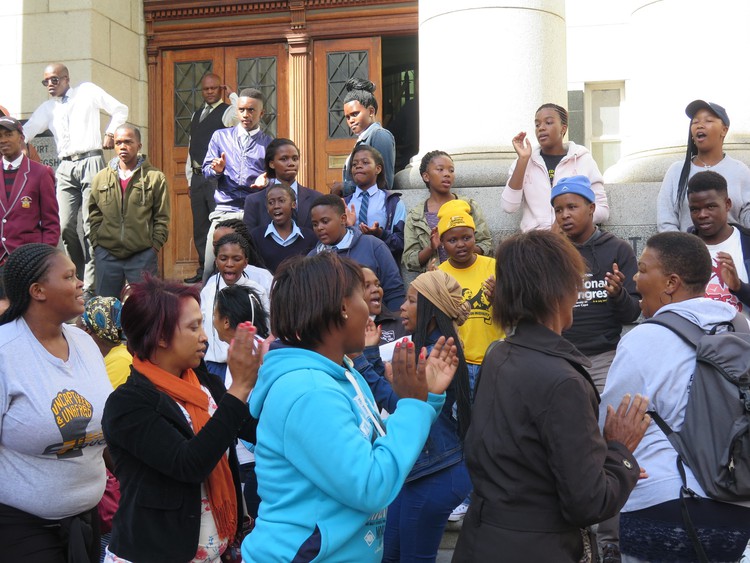
Members of the Grootkraal community and Equal Education supporters demonstrate outside the Western Cape High Court on Wednesday. Photo: Ashleigh Furlong
12 April 2017
Western Cape MEC for Education Debbie Schafer should be ordered to consider expropriating the land on which Grootkraal Primary School is situated, said a number of parties in the Western Cape High Court eviction case on Wednesday.
The school, situated near the Cango Caves in Oudtshoorn, is facing eviction after the Department was unable to reach a lease agreement with the private landowner. The school also functions as a church and community space, say the community.
On Tuesday, the school had argued that the MEC should consider expropriating the land and that she should be made to report back to the court on the reasons for her final decision. The Department argued that the court could not do this, as it would infringe on separation of powers.
The Department is not opposing the application for eviction and if granted, it plans to move the school 17km away to land that currently houses a school in Oudtshoorn.
In a counter application, the community wants its rights to the land to be recognised and for right of access to be granted so that residents can continue using the land as a church, school and space for community events.
The landowners reject that the community has any right to the land, claiming that only members of the church and the school use the land, not, as is claimed, the community.
In the Centre for Child Law’s submission, presented by advocate Karabo Ozah, it repeatedly emphasised the “best interests” of the child. Ozah said that the Constitutional Court had ruled numerous times that decisions cannot be made about children without consulting them. She said that the Department cannot just say that the school must move 17km away without considering the children’s real life situations.
As for the assertion from the Department’s counsel that school can start later so that the children do not need to get up earlier to travel to the relocated school, Ozah said that this means that they will then get home from school later as well.
To this, Judge Elizabeth Baartman said that if the Department had involved the school in the process that they took in reaching their decision, the outcome may have been different. She said that this failure was a “disrespect for their rights”.
The Centre is also asking for the MEC to consider expropriating the land. Ozah said that she disagreed with the Department’s assertion that the court cannot ask the MEC to consider expropriation.
Amicus curiae (friend of the court) Equal Education, also highlighted the “best interests” of the child. Advocate Zeynab Titus for Equal Education, said that the “child’s best interests are more important than anything else”.
She said that the right to access schooling includes a school’s security of tenure. Titus said that it would appear that the plight of the “rural child” had not changed since the end of Apartheid. She said that the school occupied a “tiny part” of the trust’s land.
Equal Education also argued that the MEC must consider expropriating the land. Titus said that as she understands it, the “bureaucratic stumbling clocks” of land reform “are not insurmountable”.
Baartman said that the court should “be careful” of accusing the MEC of doing nothing and then doing exactly the same thing. “These children need to know what the future holds,” said the judge, adding that the matter, which has dragged on for seven years, needed to come to an end.
The land is owned by a trust called the Kobot Besigheid Trust. Advocate Lawrie Wilkin, for the trust, argued on Wednesday against the counter application that is seeking for the community to have its rights to the land recognised.
One argument centred on the claim by the community that it used the property, collectively as a community, for different purposes since the 1830s. Referring to affidavits of a past teacher at the school and a member of the school body that contradict the community’s claim, Wilkin argued that the school itself had not used the full 4000 square metres over the years, and that they had “over the years encroached” on the owner’s land.
He said that only the church’s congregation and the school had occupied the land. Wilkin said that prior to the counter application that asked for the community’s rights to be recognised, “at no time” had “any member of the community said ‘we as a community have a right to the land’”.
Wilkin also said that the type of servitude that the community is asking for would restrict the owner from using the land. He also asked who would pay the rates and taxes if rights to use the land was granted and questioned who would be held accountable if someone was injured on the property or took part in a criminal activity on the property.
Wilkin asked what would happen if the community decided to use it for different purposes or wanted to build something on the land. He also argued against the community’s argument for the development of common law on the constitutional right to security of tenure.
Llewellyn Metembo, the principal of the school, addressed members of the community and supporters from Equal Education who had gathered outside the court. Metembo said that they had “so many plans to build the community up” but that these couldn’t be realised. For example, he said they were prevented from even adding additional classrooms to the school.
Pointing to the old and young members of the community who had come to court today, he said that the school isn’t just a school, but that is was “a place that belongs to the entire community”. He said that the school was taking responsibility for the entire community in a way that the trust and the department never has.
The case continues on Thursday.